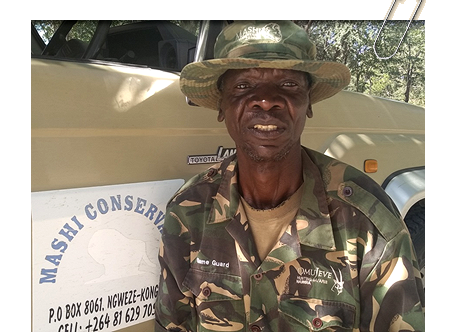A tale of a Community Game Guard: Geoffrey Divai Luhepo - Field Officer of Mashi Conservancy
Geoffrey Divai Luhepo is the Field Officer of Mashi Conservancy in the Zambezi Region, which borders Bwabwata and Mudumu National Parks and forms part of the Mudumu North Landscape. His passion for conservation began in 1991 when he joined IRDNC as a Community Game Guard, back in the days before conservancies took over the management and employment of game guards. Five years later, in 1995 he was absorbed by the then Mashi Emerging Conservancy. Over the years and based on his performance, Geoffrey scaled up through different ranks, from being a Community Game Guard, Senior Community Game Guard to Field officer.
Some of his work has involved community awareness, wildlife monitoring, combating wildlife crime, animal data collection through the Event Book System and assisting communities with mitigating human-wildlife conflict. Today the number of wildlife species has more than tripled over a five year period from 49 in 2014 to 167 in 2019, including elephants, duiker, giraffe and roan antelope; and over his 29 years of his service he has seen the change in the environment for better such as good vegetation and grazing areas for both wildlife and livestock. Because of Community Game Guards’ efforts in protecting the wildlife resources, his community now derive benefits from the sustainable utilization of natural resources, particularly income generated from conservation hunting and photographic tourism. “I witnessed how Mashi Conservancy generated income of more than two million N$ per year and based on that, cash benefit distribution to members and capital projects such as water installation, rural electrification and the construction of school blocks. These boosted community ownership over wildlife” says Geoffrey.
The announcement of the spread of COVID-19 earlier this year did not shake Geoffrey because he thought this was like any other disease which comes and passes without impacting on conservation, but his heart trembled when the management committee informed the staff of letters from tourism operators demanding reduced payments to the conservancy and the removal of what had been expected to be secured income from hunting due to their revenue losses as a result of COVID-19. This means that the conservancy will generate very little income and will not be able to cover costs like Game Guards’ salaries.
For a man like Geoffrey who is a father to three children and a bread winner for his family, it would be so difficult to live without earning a salary. He was also concerned that the Game Guards would become demotivated to monitor the wildlife which might result in increased poaching and other wildlife crimes. In the same vein, he was concerned that his community will lose jobs, capital projects and in-kind benefits from wildlife.
In this difficult situation of COVID-19, Geoffrey is appealing to all Conservancy Game Guards in Namibia to double their efforts in natural resource management to secure the future and ensure that when things are back to normal there will be even higher number of wildlife to justify conservation hunting and tourism for a quick recovery of the lost conservancy income.
“The restrictions and lockdowns due to COVID-19 are put for you and me who understands, they do not apply to criminals like poachers – so let us all safeguard our wildlife for the benefit of the current and future generation” says Geoffrey.
About the author: Reuben Mafati has worked for over 20 years in the community-based tourism in the Zambezi Region. He is currently IRDNC’s Chobe East Cluster Coordinator and Regional Enterprise Development Specialist.

- Geoffrey Divai Luhepo
Photo: Reuben Mafati



